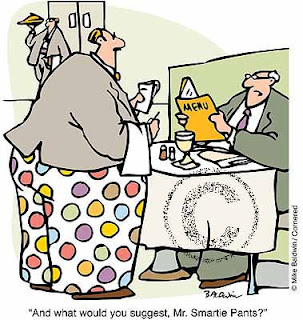Reference group influences in a restaurant

Dr. Perry had a recent interesting post titled ‘Irrational Restaurant Behaviour’ about how people eating at restaurants invariably take the help of a stranger (the waiter/waitress) in deciding what to order from the menu. The post shows how ‘irrational’ the act of asking for help is.
It’s interesting to delve into why people take this sort of help from complete strangers. Take Bangalore for example. Getting around the city, especially when trying to locate some place new, is like trying to a find your way out of a maze. While doing do, drivers find it absolutely normal to stop their vehicle, roll down the windshield and ask a perfect stranger for directions.
Why this ‘trust’ in strangers?
Decision making is always susceptible to influences. Take the case of consumers. The prime influences that consumers come under are while making a purchase decision are , a) A firm’s marketing efforts and b) the socio-cultural environment within which the consumer operates.
The different components of the socio-cultural environment that exert influence on a consumer include family, reference groups, social class, culture and subculture among others.
Consider the influence of a reference group. A reference group is any person or group that serves as a point of comparison (or reference) for an individual in forming either general or specific values, attitudes, or a specific guide for behaviour. From a marketing perspective reference groups are groups that serve as frames of reference for individuals in their purchase or consumption roles. The factors that affect the influence exerted by a reference group are information and experience that the reference groups carries (as perceived by the consumer), credibility, attractiveness and power of the reference group.
The reason why diners look to waiters / waitresses for advice on what to order is because they see them as frames of reference that can help them take a decision on what to order. Why do diners use them as reference groups? Because they perceive them as people who possess information and experience and are credible (they work in the restaurant).
The real irrational part in this act is if the diner blindly accepts the waiter’s suggestion. On the other hand, if the waiter quizzes the diner on his/her likes and dislikes, his/her taste preferences and then makes a suggestion, the irrationality in the act is reduced.
It’s interesting to delve into why people take this sort of help from complete strangers. Take Bangalore for example. Getting around the city, especially when trying to locate some place new, is like trying to a find your way out of a maze. While doing do, drivers find it absolutely normal to stop their vehicle, roll down the windshield and ask a perfect stranger for directions.
Why this ‘trust’ in strangers?
Decision making is always susceptible to influences. Take the case of consumers. The prime influences that consumers come under are while making a purchase decision are , a) A firm’s marketing efforts and b) the socio-cultural environment within which the consumer operates.
The different components of the socio-cultural environment that exert influence on a consumer include family, reference groups, social class, culture and subculture among others.
Consider the influence of a reference group. A reference group is any person or group that serves as a point of comparison (or reference) for an individual in forming either general or specific values, attitudes, or a specific guide for behaviour. From a marketing perspective reference groups are groups that serve as frames of reference for individuals in their purchase or consumption roles. The factors that affect the influence exerted by a reference group are information and experience that the reference groups carries (as perceived by the consumer), credibility, attractiveness and power of the reference group.
The reason why diners look to waiters / waitresses for advice on what to order is because they see them as frames of reference that can help them take a decision on what to order. Why do diners use them as reference groups? Because they perceive them as people who possess information and experience and are credible (they work in the restaurant).
The real irrational part in this act is if the diner blindly accepts the waiter’s suggestion. On the other hand, if the waiter quizzes the diner on his/her likes and dislikes, his/her taste preferences and then makes a suggestion, the irrationality in the act is reduced.
Comments